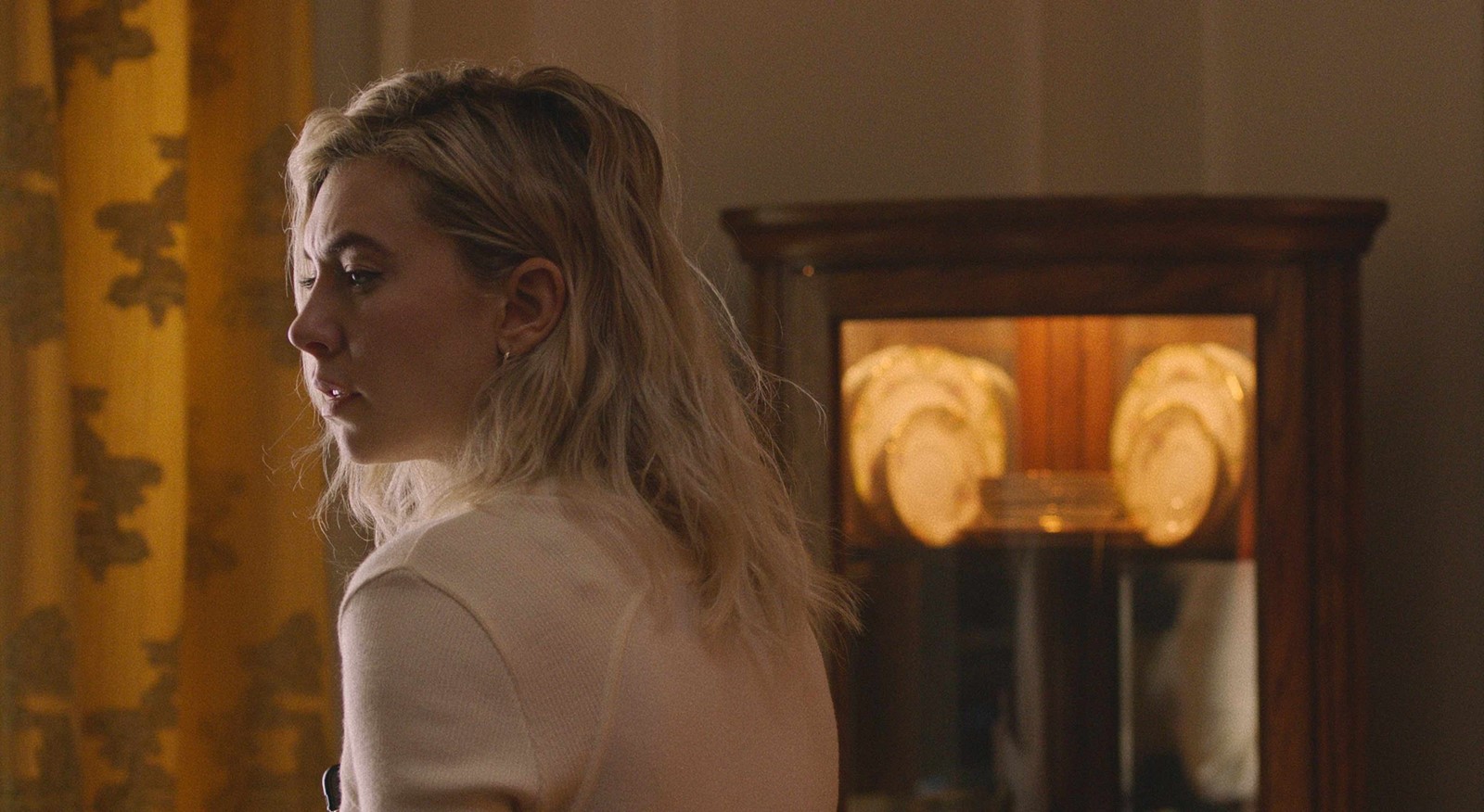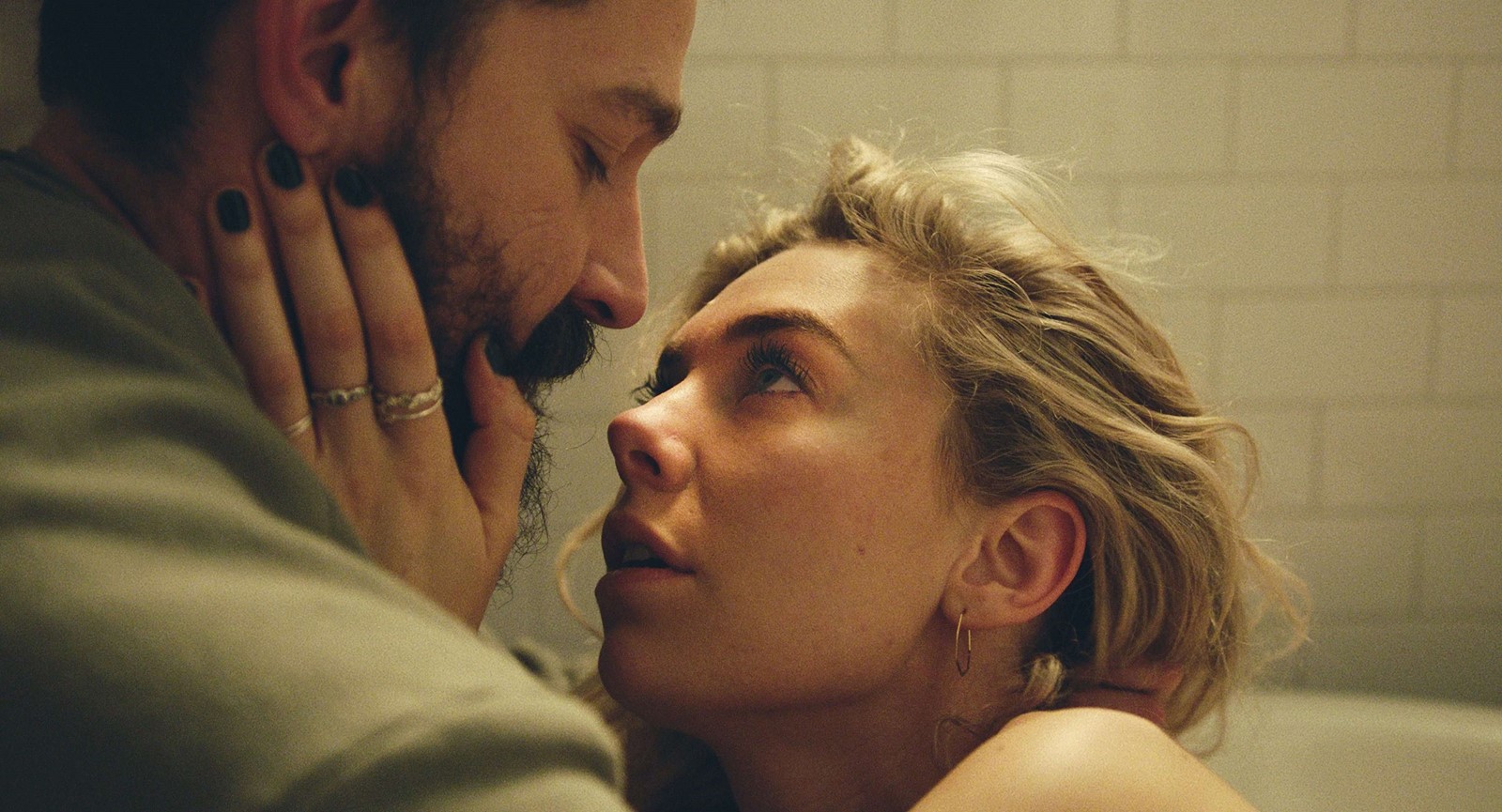Few scenes are as devastating as the opening minutes of Kornél Mundruczó’s new film, Pieces of a Woman. Set in a warm, cosily-lit living room somewhere in Boston, it follows a couple, Martha (Vanessa Kirby) and Sean (Shia LaBeouf), as they get ready for a long-awaited home birth.
At first, the mood feels light. As Martha’s contractions begin, she belches, groans and jokes, clinging onto her partner in anticipation. But then, slowly, the scene begins to unravel, slipping from domestic drama into unimaginable horror. It’s a one-shot, 23-minute sequence – heartstopping in its technical delivery – that will stay with you long after viewing.
At its core, Pieces of a Woman is a study of neonatal loss, and the varying ways we deal with grief. The film unflinchingly examines these subjects, which are rarely portrayed on screen, making it at times feel almost unwatchable. Can a relationship ever survive such an intense level of loss? Is there a right and a wrong way to grieve? And how can Martha process a pain so primal it can barely be defined by language?

The film is partly based on the real-life experiences of Kornél Mundruczó and his partner Kata Wéber. The Hungarian filmmakers have collaborated on other films in the past (White God, Jupiter’s Moon), with Mundruczó as director and Wéber as a writer. Pieces of a Woman, however, was by far the most personal. “I lost a child during pregnancy,” Wéber says, when asked about the film’s inspirations. After struggling to deal with the loss in any clear or conscious way, she moved briefly to Berlin, on her own, to try and write about it.
“I had to go away to really express myself, far away from my daughter and far away from Kornél,” she explains. “I felt that my body had been taken away from me because there were all of these people around [expressing their opinions on the miscarriage]. My body wasn’t mine. I had to regain it back through writing, which was like therapy for me.”
The script, which was initially written as a play, drew on both Wéber’s personal life and the extensively researched experiences of women who had lost children during labour. Her goal was to explore the complexity of a distressed woman’s psyche, while also acknowledging the different ways people – and entire social groups – process trauma. The result was so soul-baring that even Wéber’s partner, Mundruczó, who has known her for 21 years, was shocked by its honesty. “My reaction when I read the script was, I don’t understand this woman. I was disturbed!” he jokes. “Motherhood is a taboo, female emotions are a taboo … we lost our baby during pregnancy, but at the same time we don’t talk about it. Even inside that relationship, it was a taboo. The movie was about breaking out of the silence.”
“What unites the whole cosmos, without being dramatic, is that moment of creation. And then the other smaller things start to fall away” – Vanessa Kirby
Eventually, the pair decided to turn the script into a film and agreed that – given the importance of the subject – it should be shot in the English language to reach a larger audience. They then began scoping for the leads. Shia LaBeouf seemed like the perfect match for the boisterous, blue-collar Sean – a decision made long before the emergence of last year’s abuse allegations – while Kirby became the frontrunner for his gentle, refined foil, Martha. And although it may seem like a two-parter drama on the surface, she quickly emerges as the central focus of the film.
The process wasn’t all smooth, though. Mundruczó and Wéber initially struggled to find the right lead actress for the role, and were turned down by several big names in Hollywood. Given the tough subject matter, it wasn’t such a huge surprise. “I didn’t take it personally,” says Weber, “I thought no one should do it who is not brave enough to do it, and who doesn’t feel the necessity of doing it.” After a few months of circulation, the script finally got seen by The Crown star Kirby, who fell in love with it instantly. To secure the part, she flew from LA to Budapest the day after reading for a two-hour coffee meeting with Mundruczó. “She was shy, she didn’t want to sell herself, she wasn’t loud,” he says of the meeting. “She doesn’t play the actress role in that sense. But she was just really moved by the script.”
Today, Kirby blushes at her past assertiveness. “I just loved the script ... You just know when you know,” she says over Zoom. “This [kind of grief] is something so many women go through, and no one talks about it. And the women that have gone through it find it hard to even mention because society makes it such an uncomfortable thing. When your heart wants it to be of service to someone out there ... it makes it so much easier as an actor. That was our big purpose, and it still is really.”
Although not a mother herself, Kirby immersed herself in the role. She took antenatal classes, learned about homebirths, and shadowed a midwife in a labour ward, watching a full birth from start to finish. And, while she admits that she was “obviously terrified” about getting even “half a second” of her performance wrong, Kirby says that the research helped her tap into something more primal. “[Watching someone give birth] was probably one of the most profound moments of my life,” she says, her eyes widening. “I remember every second of it. The moment when the mother’s son came out and they were together, it was just phenomenal. It made me realise, god, that’s what life is. That moment right there is what we all have in common, that’s what unites everybody. What unites the whole cosmos, without being dramatic, is that moment of creation. And then the other smaller things start to fall away.”
Despite its gruelling opening scenes, much of this hope filters through Pieces of a Woman. It’s a film about loss but also, more crucially, about healing, and our formidable capacity to regather and forgive even in the bleakest of circumstances. For Wéber, the filmmaking process gave her some catharsis on her own story, while also offering much-needed solidarity to those who have gone through much worse. “It was really almost spiritual because of the intensity of the whole thing,” she says, finally. “To be respectful for all those who lost their loved ones, I think all the cast had 1000 per cent of concentration. It was really amazing.”
Pieces of a Woman is available to stream on Netflix from January 7.
